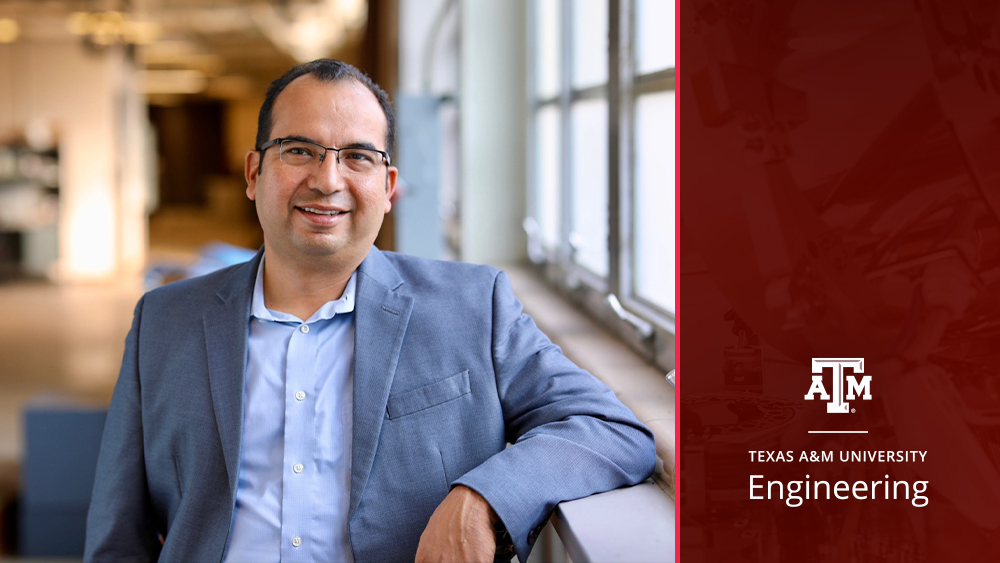
Dr. Raymundo Arróyave, professor in the Department of Materials Science and Engineering at Texas A&M University, has been honored with the prestigious 2023 Acta Materialia Silver Medal. This annual award recognizes and celebrates scientific contributions and leadership in the academic, industry or public sector.
“I am grateful for all the support of my family, and I'm also very grateful to all my colleagues and students,” Arróyave said. “There are a lot of excellent researchers in this field, so being selected for this award is satisfying. At the same time, it’s humbling because other people are worthy of this award, and I was lucky enough to be selected.”
Arróyave is being awarded the medal for his work in computational materials science and alloy design. He said this research has been his goal for the past decade and is what motivates his career.
“We have successfully developed a highly efficient method for addressing alloy design challenges,” Arróyave said. “My ultimate goal as a scientist is to master the art of material design. To achieve this, we have learned to integrate ideas from various disciplines beyond materials science. I am fortunate to have had the guidance and support of many knowledgeable colleagues who have shared their expertise with us.”
Arróyave and his team of students figured out how to do a calculation or implement a particular algorithm that can be used to design a material, he said. From there, they used this framework to suggest to their experimental colleagues the best materials to make and test.
For this research, Brent Vela, a doctoral student in materials science and engineering, said that Arróyave emphasizes the need to collaborate and work together to get things done on time, contributing to making this cutting-edge research work.
“Dr. Arróyave makes sure that his students are able to communicate — he stresses that a lot,” Vela said. “I think that's a factor in getting this award for him and where a lot of his success comes from. We try to impress with the work we do, and Dr. Arróyave doesn’t want us to be timid or settle for small things. We really push the envelope with our research.”
Early in his academic career, Arróyave and his group focused on tackling small challenges.
"Initially, we were working on building tools incrementally,” he said. “But then we began to focus on a more methodical and algorithmic approach to material design, rather than relying on trial and error."
Having been Arróyave’s student for over two years, Vela said he has learned additional practices aside from the materials science and engineering industry, including how to market his ideas for research.
“I've learned from him that it’s important to market your ideas. It's not enough just to have a good idea,” Vela said. “Plenty of people have good ideas, but you need to be able to market and package them and help people understand them and why they are important. Dr. Arróyave is good at that.”
Arróyave made his way into materials science and engineering after he received a bachelor’s degree in mechanical and electrical engineering in 1996 from the Instituto Tecnológico y de Estudios Superiores de Monterrey, located in Mexico.
He began working in a steelmaking company’s research and development department, helping with experiments. At one point, the company was thinking of modifying the composition of its steel by adding or removing ingredients.
This interested Arróyave, and he decided to apply to grad school. He received a master’s degree in materials science and engineering from the Massachusetts Institute of Technology in 2000. Four years later, he received a doctoral degree in materials science and engineering.
“To me, it’s the thrill of figuring out how to do things,” Arróyave said. “That was the main drive for me to apply to grad school, as I was trying to figure out what it is that people that design alloys do.”
After a postdoctoral position at Penn State University, he joined the J. Mike Walker ’66 Department of Mechanical Engineering at Texas A&M in 2006. In 2017, he became a professor in the materials science and engineering department, which he helped found in 2013.
“Arróyave has made tremendous contributions to the field of data-driven and computational materials design over the years,” said Dr. Ibrahim Karaman, head of the materials science and engineering department. “He is a selfless team player and a motivating research collaborator.”
Arróyave will receive the Acta Materialia Silver Medal at The Minerals, Metals & Materials Society’s annual meeting in March.
“His contagious enthusiasm has played a major role in taking the new materials science and engineering department at Texas A&M to the next level, making it one of the largest material science departments in the country with about 500 students,” Karaman said.